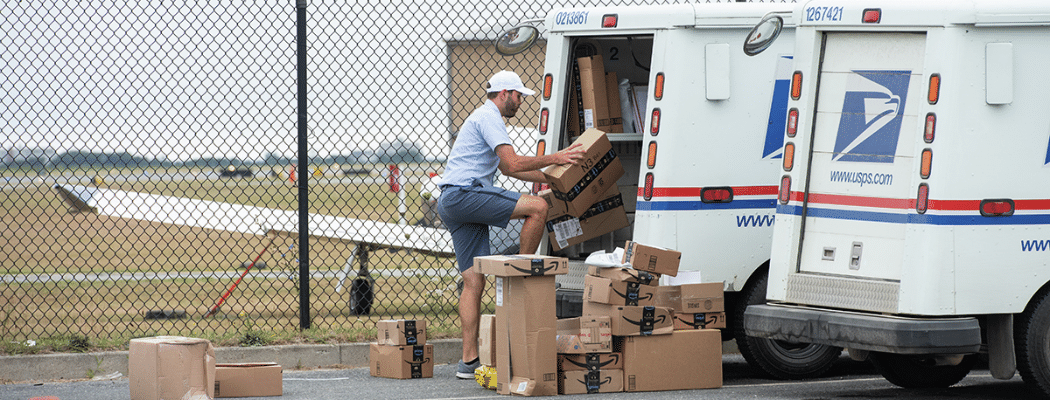The national controversy over the U.S. Postal Service arrives on Nantucket.
Historically, the United States Postal Service (USPS) has been synonymous with dependability. As their motto goes, “Neither rain, nor sleet, nor dark of night shall stay these couriers from the swift completion of their appointed rounds.” But today Americans lament that the USPS is not only failing to deliver on its pledge, but in many cases it’s not delivering at all. Serious breakdowns in service have occurred in 31,000 post offices across the country, including the four here on Nantucket.
 Beginning this spring, delays for packages sent to the island went from days to weeks, and in some cases, even months. By July, long lines began forming at the USPS annex, with some waiting for hours to collect their packages. USPS Northeast spokesman Steve Doherty insisted that the delays were due to the dramatic volume of packages being shipped to the island. “We believe due to the COVID pandemic and the fact that a lot of the brick-and-mortar stores are closed, more and more people are buying online,” he explained. “So we’re seeing volume that’s beyond what we see during Christmas time.”
Beginning this spring, delays for packages sent to the island went from days to weeks, and in some cases, even months. By July, long lines began forming at the USPS annex, with some waiting for hours to collect their packages. USPS Northeast spokesman Steve Doherty insisted that the delays were due to the dramatic volume of packages being shipped to the island. “We believe due to the COVID pandemic and the fact that a lot of the brick-and-mortar stores are closed, more and more people are buying online,” he explained. “So we’re seeing volume that’s beyond what we see during Christmas time.”
Packages shipped to Nantucket first make a stop in Wareham at the Cape and the Islands packaging hub where they are staged to be loaded on planes and ferries. “We have contracts with the boats and the airlines, but we have a fixed amount of space on those,” Doherty said. “We can’t go out and buy a boat or a plane.” As a result, once the contracted planes and ferries reach their capacity, any remaining packages get left in the hub in Wareham. “There’s stuff that’s been sitting in Wareham for a week or more,” Doherty admitted. “We’ve being playing catch up for a while, and it doesn’t appear to be slowing down anytime soon.”
 While an increase in packages might explain shipment delays to the island, mail sent from Nantucket has also been anything but timely. A simple letter sent from Nantucket to Boston this July took more than ten days to complete its journey to the recipient. These kinds of delays appear to go beyond the backlog in transportation Doherty described and might be more emblematic of the nationwide breakdowns in the postal service that many believe are intentional and politically motivated.
While an increase in packages might explain shipment delays to the island, mail sent from Nantucket has also been anything but timely. A simple letter sent from Nantucket to Boston this July took more than ten days to complete its journey to the recipient. These kinds of delays appear to go beyond the backlog in transportation Doherty described and might be more emblematic of the nationwide breakdowns in the postal service that many believe are intentional and politically motivated.
Since his inauguration, President Donald Trump has railed against the USPS. As he tweeted in December 2017, “Why is the United States Post Office, which is losing many billions of dollars a year, while charging Amazon and others so little to deliver their packages, making Amazon richer and the Post Office dumber and poorer?” While the USPS has been firmly in the red for more than a decade, many argue that the reason for its multibillion-dollar deficient has far less to do with Trump’s arch nemesis Jeff Bezos and more to do with his predecessor George W. Bush.
 In 2006, President Bush signed the Postal Accountability and Enhancement Act (PAEA), which mandated that the USPS prefund retirement plans for not only current employees but also future employees for the next fifty years. In other words, the USPS was forced to estimate the number of employees it would have in the next fifty years and set aside billions of dollars each year for those retirements. As a result, by 2016, the USPS lost $64 billion, nearly 90 percent of which was due to the PAEA. Add to the mix a drop in demand due to email and shipping competitors like UPS and FedEx, and the USPS was already flailing before Amazon.
In 2006, President Bush signed the Postal Accountability and Enhancement Act (PAEA), which mandated that the USPS prefund retirement plans for not only current employees but also future employees for the next fifty years. In other words, the USPS was forced to estimate the number of employees it would have in the next fifty years and set aside billions of dollars each year for those retirements. As a result, by 2016, the USPS lost $64 billion, nearly 90 percent of which was due to the PAEA. Add to the mix a drop in demand due to email and shipping competitors like UPS and FedEx, and the USPS was already flailing before Amazon.
Still Trump continued to point to Amazon as the source of the Postal Services woes. “I am right about Amazon costing the United States Post Office massive amounts of money for being their Delivery Boy,” he tweeted in April 2018, a week before signing an executive order that assigned a task force to audit the USPS. Since then, the Trump administration has overseen a volatile restructuring of the institution that has led to the resignation of top post office officials, including Deputy Postmaster General Ronald Stroman and David Williams who had served as the USPS inspector general for thirteen years before taking a post on the USPS Board of Governors in 2016.
Williams’ departure in June was prompted by friction with Treasury Secretary Steve Mnuchin, who stipulated that the USPS needed to turn over proprietary information to him about its contracts with private sector third-party shippers like Amazon in order to receive a $10 billion loan al- located in coronavirus relief funding. Meanwhile, Stroman’s resignation was in response to the appointment of a top Trump donor as the postmaster general in May.
North Carolina businessman and Trump mega-donor Louis DeJoy became postmaster general despite having no post office experience. In fact, DeJoy, who donated $1.2 million to the Trump Victory Fund and millions more to the Republican National Committee, is the first postmaster general to be appointed from outside of the USPS in more than twenty years. DeJoy was the chairman and CEO of New Breed Logistics Inc., a transportation company that had billions of dollars of contracts with the USPS stretching back to the mid-nineties.

“It will be an incredible honor to serve as postmaster general,” DeJoy said in a statement issued after his appointment, “and I commit myself to upholding the Postal Service’s cherished role in our nation.”
Despite this pledge, DeJoy subsequently eliminated overtime and implemented cost-saving measures that have hamstrung mail carriers and gravely impaired the USPS from performing its “cherished role in our nation.” He has reportedly changed the mandate of postal carriers. In an internal USPS memo obtained by the Associated Press, DeJoy stated that “one aspect of these changes that may be difficult for employees is that—temporarily—we may see mail left behind or mail on the workroom floor or docks.” By mid-July, DeJoy’s changes were in full effect, causing nationwide delays in mail delivery.
When asked if DeJoy’s new measures have had any bearing on the mail delivery to and from Nantucket, Doherty said, “I’ve heard rumors to that effect, but anything we’ve seen in terms of package delay we can directly relate to the sheer volume, as opposed to any other stuff.” That being said, Doherty did admit that in his twenty-five years working in the Postal Service he has never seen the institution under so much public scrutiny. “Never to this extent,” he said.
 This scrutiny is largely a result of Trump’s ongoing assault on mail-in voting. Despite fears that the coronavirus will prevent people from voting in the next presidential election, and despite the fact that he and many members of his administration have voted by mail, Trump has continually attacked mail-in voting in a barrage of tweets and statements that have gone as far as to suggest that the election should be delayed. “With Universal Mail-In Voting (not Absentee Voting, which is good), 2020 will be the most INACCURATE & FRAUDULENT Election in history,” Trump tweeted on July 30th. “It will be a great embarrassment to the USA. Delay the Election until people can properly, securely and safely vote???”
This scrutiny is largely a result of Trump’s ongoing assault on mail-in voting. Despite fears that the coronavirus will prevent people from voting in the next presidential election, and despite the fact that he and many members of his administration have voted by mail, Trump has continually attacked mail-in voting in a barrage of tweets and statements that have gone as far as to suggest that the election should be delayed. “With Universal Mail-In Voting (not Absentee Voting, which is good), 2020 will be the most INACCURATE & FRAUDULENT Election in history,” Trump tweeted on July 30th. “It will be a great embarrassment to the USA. Delay the Election until people can properly, securely and safely vote???”
In the context of an election year that will depend on mail-in voting, the possibility that new delays to the USPS have been intentionally caused by a major Trump donor has raised serious suspicion—and not just among conspiracy theorists. During his eulogy of John Lewis, a civil rights pioneer who fought to protect the right to vote, former President Barack Obama called out the Trump administration for “undermining the Postal Service in the run-up to an election that’s going to be dependent on mail-in ballots so people don’t get sick.”
 Less than a week later, in early August, the House Oversight Committee called Postmaster General DeJoy to testify on September 17th regarding, as Oversight Chair Carolyn Maloney described, “the need for on-time mail delivery during the ongoing pandemic and upcoming election.”
Less than a week later, in early August, the House Oversight Committee called Postmaster General DeJoy to testify on September 17th regarding, as Oversight Chair Carolyn Maloney described, “the need for on-time mail delivery during the ongoing pandemic and upcoming election.”
Later that very same day when the Oversight Committee sent the letter to DeJoy, he raised even more alarm by reassigning twenty-three postal service executives in what appeared to be a maneuver to consolidate his power. Amid growing alarm, Democrats moved the hearing up to the end of August, which prompted DeJoy to announce that he would reverse his cost-cutting measures until after the election.
As for mail-in voting on Nantucket, Doherty indicated that he was not concerned that this summer’s delays would have any impact on the election. “Mail-in voting is nothing new to the Postal Service,” he said. “It’s something we’re gearing up for in the same way we do for Christmas every year with the expected surge in packages. We’ll have the resources in place.” While the USPS has persevered through rain, sleet, and dark of night for hundreds of years, the question still remains whether this historic institution can find deliverance through these political storms.









